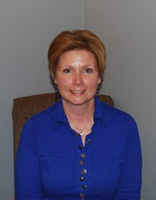For three nights in a row, Anne Karjala-Dobbins dreamed she had breast cancer. The first two nights she shrugged off, but after the third, she took action. She did a self-exam and found the lump her subconscious was warning about. Soon after, doctors confirmed it was cancer.
Anne had a lumpectomy in late 2012, followed by four months of chemotherapy, six weeks of radiation, and then six more months of intravenous drug treatments.
“You never come through something like this without changes,” Anne says. “I still have pain. I still have limited range of motion. But I’m cancer free.”
Survival is Not Enough
Today, Anne facilitates a support group for cancer survivors. She helped establish the group after talking to her doctor about the need for a more frequent, more intimate addition to the hospital’s quarterly support sessions.
“It’s not enough to survive. We need a good quality of life,” says Anne, whose treatments triggered early onset menopause, among other side effects. “This is an opportunity to share our experiences and lift each other up.”
Off a Cliff
The small group sessions are designed for women in treatment as well as survivors. Participants often include women from every treatment phase, from those who are just beginning chemotherapy to women who finished care five years ago.
“People have told me it’s helping,” she says. To explain, she describes the emotional turmoil women go through as they finish treatment and return to their everyday lives:
“You go through this intense period, and you’re on a first name basis with everyone—doctors, nurses, and reception. And then when treatment finishes, women feel like they’ve dropped off a cliff. There’s no one asking, ‘How are you?’ and meaning it.”
A support group provides a way for women to maintain that same sense of connection and support, after the medical interventions are over.
No More Chattering
Anne has many more examples, demonstrating how a support group can help women overcome feelings of isolation and fear. It’s a benefit she herself has experienced “I think one thing every survivor deals with is feeling like the cancer is going to ‘getcha’ someday,” she says. “That fear of recurrence is always there. But I feel more hopeful now. I feel reassured. That chattering isn’t at the back of my head anymore.”
Aurora BayCare offers large group support and educational meetings for breast cancer patients and their families. The next session is scheduled for October 17, and will be held in the Aurora BayCare Orthopedic Sports Medicine Center.
